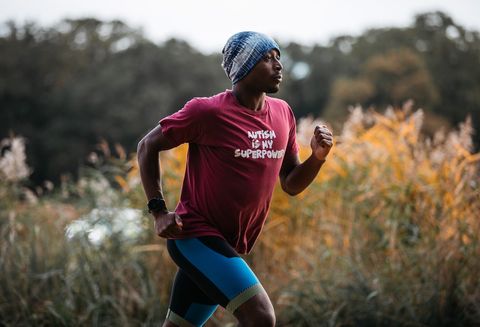Sam Holness doesn’t consider his autism to be a disadvantage in the sporting arena; he considers it his superpower. It has gifted the 27-year-old, London-based triathlete with the ability to focus intently for long periods, particularly when engaged in repetitive tasks such as swimming, running, and cycling.
“We’ve had to adapt our training to work with Sam’s autism, but this has been made easier by his single-mindedness,” says his father and coach Anthony Holness. In the long run, Anthony thinks, it may even give him an advantage over neurotypical athletes.
https://www.instagram.com/p/CK_fer-hUZ7/
A post shared by Sam Holness (@samholnesstri)
It certainly hasn’t limited his ambition. The duo has big goals for 2021: Sam intends to be the first triathlete with autism to take on the Ironman World Championship in Kona, Hawaii, and the first to turn professional. If all goes to plan, he hopes to complete the grueling event—which encompasses a 3.8km swim, 180km cycle and full-marathon run—in sub 11 hours.

Research shows that people with autism are less likely to participate in sports than their neurotypical peers. This is in part due to the challenges some may face in social situations, but also due to misconceptions about suitability and aptitude.
Despite displaying a natural talent for sport from a young age, Sam and his father say he faced obstacles. “I always wasn’t encouraged to participate,” says Sam, “even when I was one of the best swimmers in my secondary school.” Teachers would sometimes question whether Sam was fit to compete alongside the other students. Many coaches simply were not equipped to properly coach young people with autism.
It wasn’t until he took up running in his late teens that things started to change. Sam completed his first triathlon at Dorney Lake. The long event time allowed him to compensate for any issues with his fine motor skills during transitions, while his ability to become absorbed in an activity meant maintaining concentration wasn’t a problem. He never looked back.
https://www.instagram.com/p/CHsqy0RhbLl/
A post shared by Sam Holness (@samholnesstri)
Just as Sam is setting out a path into the sport for others on the autistic spectrum, so too is he breaking ground for aspiring Black athletes. One study shows that Black competitors account for just 1.4% of triathlon participants. “Sometimes when I go to an event, I am the only Black triathlete, as well as the only one with autism,” he says. “But it doesn’t matter that it’s just me. I just like racing.” Figures from Sport England show that 95%of Black adults and 80% of Black children do not swim, something that Sam and his father hope to change by increasing his profile within the sport of triathlon.
https://www.instagram.com/p/CJTzt10Bq3s/
A post shared by Sam Holness (@samholnesstri)
A point of contention for Sam’s father, Anthony, is the binary nature in which athletes are labeled as either disabled or non-disabled. Due to his higher IQ score (he also holds a degree in Sports Science), Sam does not qualify for the Paralympics. Anthony would like to see governing bodies re-evaluate their entry criteria.
But for now, says Sam, he’s happy to be changing attitudes: “I’m proving that an athlete with autism can compete at the same level as elite triathletes.”
For more information on autism, visit the National Autistic Society.
Source: Read Full Article